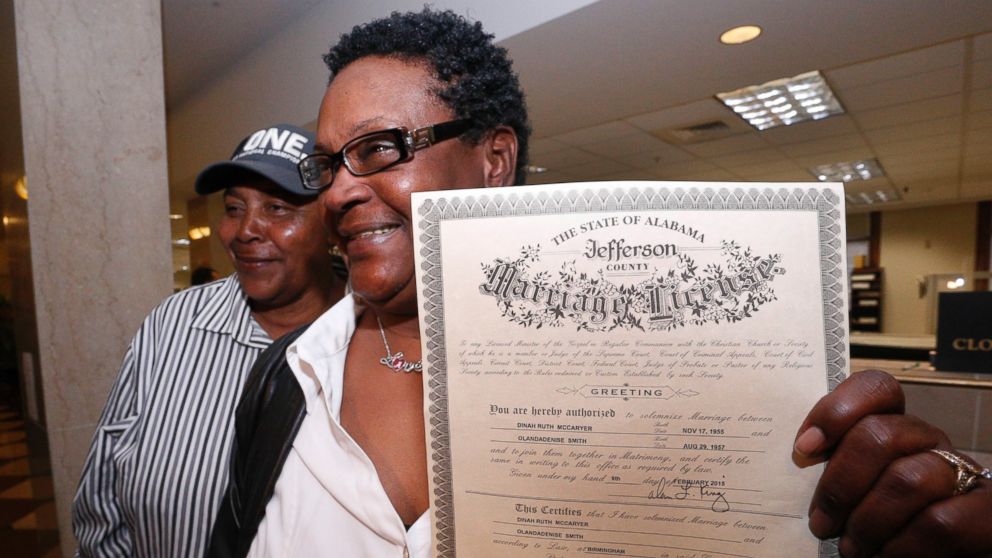Alabama Gay-Marriage Turmoil Leaves Potential 2016 Candidates Speechless
What possible 2016ers aren't saying about Alabama's same-sex marriage ruling.

— -- Same-sex couples married in some Alabama courthouses today, but many counties still refused to allow the unions to proceed despite rulings from a federal judge and the U.S. Supreme Court, which allowed them to begin in the state Monday.
Where the potential 2016 presidential candidates stand on the issue is hard to know, because most of them are not weighing in.
ABC News reached out to the prospective candidates to ask whether judges in the state should be following or disobeying the federal ruling, and most declined to comment or didn’t respond to requests for comment.
Sen. Marco Rubio, R-Fla., declined to comment on the specific case in Alabama, but noted that states will have to comply with what the Supreme Court decides on same-sex marriage this summer.
"I've just read the headlines about what's happening in Alabama, so I'm not quite sure what the details are with regards to what the legal arguments the state is using as to why they don't need to comply with it," Rubio said.
"I believe marriage should be between one man and one woman. I believe states - through their legal process, through their legislative process - have the right to define it any way they choose, although I would strongly advocate for what I believe should be traditional marriage."
Rubio continued: "There's going to be a Supreme Court ruling in June of this year so they say and I think that would answer a lot of questions about the future of that question in our country and I think that unless that case is overturned by a future Supreme Court or by a constitutional amendment, which I don't see as likely, states are going to have to comply with whatever that ruling is."
Dr. Ben Carson, the former neurosurgeon and conservative favorite, was by far the most specific of the possible candidates writing in a statement the issue should be left to the states saying, “The ruling by Alabama federal Judge Callie Granade to strike down the state's ban on same-sex marriage as unconstitutional is an example of why such a matter should be left to state judges.”
"While these appointed federal officials certainly hold a great deal of knowledge and the ability to make important decisions, the issue of marriage -- an institution that has been so clearly defined and guarded by this nation for centuries -- should be decided upon by the state court as it pertains to that particular state's residents," Carson said. "Alabama's elected Chief Justice Roy Moore understands the importance of preserving states' rights in the modern post-Civil War world in which we live. This should be a state issue rather than a federal issue because judges at the state level must answer to the people in that state. When judges have no responsibility to the will of the people in the state, they do what they want without any consideration or obligation to the people. That is the reason why the United States Constitution assigns civil matters of this nature to the state."
Former Texas Gov. Rick Perry, a Republican, also said he believes it is a "state issue."
"The Supreme Court will take it up in June," Perry spokeswoman Lucy Nashed said. "Until then, this is a matter between the State of Alabama and the courts."
Louisiana Gov. Bobby Jindal said he wants to see Congress pass an amendment to the Constitution if the Supreme Court overrules gay-marriage bans in the states.
"We're a nation of laws, that's why I said I want the Supreme Court not to overturn our laws," the Republican said on CNN's New Day this morning. "If the Supreme Court were to do this, I think the remedy would be a constitutional amendment in the Congress to tell the courts you can't overturn what the states have decided."
Sen. Lindsey Graham, R-S.C., said, "I support traditional marriage and the courts are working their way through this issue, but at the end of the day, the supremacy clause is the supremacy clause," referring to federal law and the U.S. Constitution that take precedence over state laws.
Former Hewlett Packard CEO Carly Fiorina, a Republican, also kept it vague, saying in a statement "this is an important conversation that is going on in homes, churches, and communities across the country. I think that the worst thing the federal courts can do right now is shortcut this conversation."
Senator Ted Cruz, R-Texas, has not directly commented on the status of same-sex marriages in Alabama, but on Tuesday, he reintroduced the “State Marriage Defense Act,” a piece of legislation which would require the federal government to defer to the states on whether same-sex couples should marry.
“Even though the Supreme Court made clear in United States v. Windsor that the federal government should defer to state ‘choices about who may be married,’ the Obama Administration has disregarded state marriage laws enacted by democratically-elected legislatures to uphold traditional marriage,” Cruz said. “I support traditional marriage and we should reject attempts by the Obama Administration to force same-sex marriage on all 50 states. The State Marriage Defense Act helps safeguard the ability of states to preserve traditional marriage for their citizens.”
Cruz also plans to introduce a constitutional amendment to “further protect marriage” later this year.
New Jersey Gov. Chris Christie, Wisconsin Gov. Scott Walker, Ohio Gov. John Kasich, Indiana Gov. Mike Pence, former Florida Gov. Jeb Bush, former Arkansas Gov. Mike Huckabee, former Pennsylvania Sen. Rick Santorum, Kentucky Sen. Rand Paul, all Republicans, and Sen. Elizabeth Warren, D-Mass., did not respond to requests for comment.
ABC News' Benjamin Siegel, Jordyn Phelps and Liz Kreutz contributed to this report.